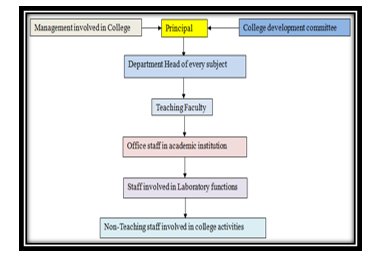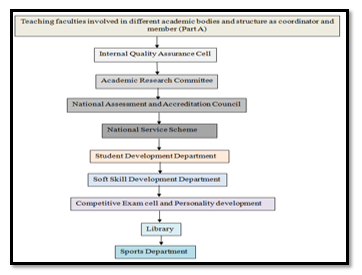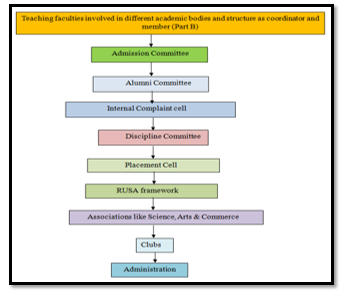Ijraset Journal For Research in Applied Science and Engineering Technology
- Home / Ijraset
- On This Page
- Abstract
- Introduction
- Conclusion
- References
- Copyright
Structure, Function and Fundamentals involved in College Higher Education System for Different Educational Stakeholders
Authors: R. M. Nikam, A .P. Patil, K. H Kapadnis, D. T. Tayde, R. Y. Borse, Dilip Shinde
DOI Link: https://doi.org/10.22214/ijraset.2022.46460
Certificate: View Certificate
Abstract
Indian higher education system drastically changing with time from the autocratic path to democratic route. In ancient days the higher education was the part of bread and butter for stakeholders like students under the petronage of ruler or king and his deployed authorites. The needful education was the part of religion and caste based necessities to stakeholders. But todays higher education has been cultivating under the path of democratic front or path is responsible to change the globe around the stakeholders with respect to heritage, culture, mass and ritualism. This change was the total efforts made by higher education system and its different corners like structure, function and fundamentals. The value based education is constantly and continuously provided by teaching faculties, mentors, educationalist and education policy makers. The structure of college education, involvement of management for providing basic facilities to college system and stakeholders for their development in all respect, the administration of academic H.O.D.s like head of the institition (Principal), cordination of head of the institution with management, teaching and non-teaching faculties, the dedication of teaching faculties or mentors towards their stakeholders, the significant level and functions of officials staff and non-teaching staff as an administrator support and smooth work of college system was responsible to nurture and develop the values in stakeholders. This will help stakeholders to educate in society, thereby educate society too.
Introduction
I. INTRODUCTION
In college higher education system role of academic bodies like head of the institution, head of departments of each faculties, incharge of every discipline, teaching faculties, mentors, councellors, office administrative staff including clerk, headclerk, office superitendant and registrar is vital and prominent to plan and execute every rules and regulations, to follow the best path for stakeholders, to implement education policies governed by Indian organizations like University Grants Commission (U.G.C), Rashtriy Ucchatar Shiksha Abhiyaan (R.U.S.A) and Universities in contact to higher education. The head of the academic education is termed as Principal who is the solely responsible to manage every scheme implemented by Higher Education Instititions (H. E. Is), Government Institutions, Indian universites. Academic and administrative head of the institutions are responsible for quality of higher education, academic index and growth of institution, administrative profile in his/her influence of atmosphere or circle of higher education.
Teaching faculties of higher institution or college are deeply involved in academic work of college. Teaching and mentoring are the two essential function of teaching faculties. Under the monitoring environment of Head of the institution different teaching staff are continuosly engaged with the aid of time table hours made by time table committee. Different teaching staff has been involved in curricular and extra curricular activites, along with different committees like admination, advisory, academic and administrative committees.

The role of teaching staff is to be function as mentor and councellor along with effective delievary in lectures, practicals, seminars, teutorials. Nowdays teachers in the higher education field are categorized as assistant professors, associate professors and professors. Teachers are the head of the institution or cordinator or member of different committees like Internal quality assurance cell, National assessment and acrediatation council, Academic research committees, National service scheme, student development department, soft skill development, library, sport committee and competitive exam cell, personality development and carrier guidance cell. The teachers are continuously enegaged in different academic and administrative committees and activities including admission, alumni, placement cell, internal complaint cell, RUSA, clubs like nature and eco club, arts, science and commerce associations.
II. MATERIALS AND METHODS
This article deals with study of duties and functions of academic bodies involved in centre core of academic structures like college or university. This article is our vital efforts to induce and understand the importance, functions, structure and fundamentals, of academic bodies like head of the institution (Principal), Deputy Principal, Head of every subject, Incharge of every faculties, Teachers, faculties, mentor, councellors, college officials, peons, attendant and assistant, different beaureocrat in academics to society.

III. DISCUSSION
A. Importance of Head of Institution/Principal in Higher education:
The different functions and responsibilities of Head of academic institution are as under
- To organise and minute regular department meetings for academic purpose.
- To be aware of needs of each member in institution and to find the time to provide individual advice and to listen their concerns.
- To monitor the quality of report writing of the institution.
- To keep abreast of of current educational thinking and to be involved as much as possible.
- To arrange and attend the meetings to discuss particular curricular or academic issues.
- To empoly and execute different schemes related to education.
- To connect and maintain equilibrium between each department and faculties.
- To provide a plan of expenditure for the department for the forthcoming year when required to do so.
- To take responsibility for the annual budget of the department/institution to ensure that it is used in accordance with the guidelines.
- To keep accurate records of the institution, well orderd files and records of college documents including all concern minutes of meetings.
- To explain the decisions as needful to staff and students in the institution.
- To develop plan for future improvements about the institutional facilities .
- To survey any day-to-day damage to furniture, fittings and fabric.
- To report of any damage concern to Management authorities.
- To be aware of cleanliness of the institution for good returns of the stakeholders.
- To take part in the appraisal of members to staff as a part of college staff development programmes.
- To watch about teaching staff involved in regular teaching and their different role in academics for stakeholders.
- To arrange and devise a staff induction programmes and college induction programme to new staff.
- To organize the work for support staff and technicians for their complete involvement.
- To organize a in-service training of members of the department.
- To develop the subjects contribution to the moral, spiritual, aesthetic, physical and intellectual education of every student.
- To apply cross-curricular policies and themes and to bring them into the work of development.
- To provide stimulating classroom environment throughout the institution in terms of lessons, wall displays and use of resources.
- To provide opportunities beyond the classroom in the form of societies, trips, visiting speakers, excursions and field workin term of time and holidays as appropriate.
- To provide students with advice on Higher education courses and to maintain links with universities as appropriate.
- To ensure that each student is treated according to the principles and aims of mission and vision statement.
- To cordinate examples of good practice and to enable teachers to share exercises, programmes of study.
- To steer different committees involving N.A.A.C, multidisciplinary committees including academic and administrative committees, university committees.
- To produce and keep an instituional handbook and produce and represent on time to time on demand of government authorities, Management bodies.
- To define college/institution with pace of time for its development and growth for academic excellancy.
- To look and ensure hours of time table produced by Time-table committee.
- To hold a power for smooth work of higher institution/college with respect to daily routine.
- To keep abreast of new techniques and technologies handled in world for implementation to college stakeholders like students for welfare of society.
- To maintain discipline in college/institution as per the guidelines decided by affiliated universities.
- To maintain equilibrium between society and stakeholders such as parents, students with teaching staff and non-teaching staff.
- To indulge the rational, social, scintific and moral values to stakeholders.
- To focus the growth and development of college/institution to higher culmination or peak values[1].
B. Importance of Teaching staff in higher education
The different functions and responsibilities of Head of Departments of subject and discipline are as under
- To take the lectures, practicals, workshop, seminars as directed in time-table of the institutions.
- To enhance the academic level of student/stakeholder.
- To add value based education along with basic foundation for the development of stakehoders.
- To build the students carrier for the point of view employment.
- To make results accordingly to university leisure or spreadsheet.
- To notify important notices on time to time to stakeholders/students.
- To prepare the study material before a lecture to students while conducting the lectures.
- To maintain discipline in class-room as well as college campus.
- To avoid any misconduct/wrong behaviour which will deliberately harmful to college discipline and atmosphere.
- To take extra efforts through hours of study for the development of education of students.
- To equallize every student through all corners of equility with respect to class, religion and rituals.
- To superimpose every student on the basis of quality based education.
- To observe the cleanliness of classroom for the standard of institution.
- To stick/paint wall of classroom for the academic stakeholders/institution through poster presentation by participating students in different activities of poster presentation.
- To give the different modules, projects involving research concepts, work associated experimental methods.
- To nurture the natural education in students [2].

C. Role Of Teaching Staff For Stakeholders Through Participation In Various Academic Bodies And Structure
- Internal Quality Assurance cell (I.Q.A.C.): A one of the staff member selected in academic meeting of institution is acts as fundamental base a Coordinator for I.Q.A.C and wholly responsible. He/she writes the data collected in every year by different academic cells in Higher education system. He uploads the data in the portable document format to the portal of National Assessment and Accreditation Council and Higher education [3].
- Academic Research Committee (A.R.C): Academic Research Committee is important committee of college. It is actually connected with research and development (R & D) of college. The committee organizes the research schemes at college which are given by university or different funding agency like D.S.T, F.I.S.T, and U.G.C approved grants in research and development. The coordinator of A.R.C conducts the different projects in research through AAVISHKAR or other platform for stakeholders like students [4].
- National Service Scheme (N.S.S): National service scheme is the backbone of college activities. The coordinator of National Service Scheme department plans and executes the regular activities and N.S.S camp activities. The regular activity includes the overall personality development of students through different corners like social, cultural and ethical views. NSS camp is the activity of seven days at adopted village in rural area for social reformations [5].
- Students Development Committee (S.W.O/S.D.O): Student’s development committee coordinator is also called as student’s development officer at college and university level. He/she plans and executes different schemes like earn and learn scheme, students personality program, special guidance scheme, Nirbhay Kanya Abhiyaan, students insurance plan drawn by Universities and its implementation at college or universities if any claim arises, set up of students council in college and universities so as to consider the importance and role of students at college campus and university level [6].
- Soft Skill Development Department (S.S.D.D): Soft skill development officer has a prime responsibility to nurture and inculcate the soft skills and hard skills in college stakeholders and university stakeholders. He is coordinator of soft skill development programme implemented as per the university guidelines. He or she should be at least assistant professor and should be completed a short term course for train the trainee programme of any concerned university or a platform of training. In changing scenario of society soft skills are essential for employees as well as students [7].
- Competitive Exam Cell (C.E.C): Competitive Exam Cell coordinator is the chief of all Competitive Exams to be given by stakeholders. He analyze the students power to do the key frame or steel frame needful to society. In India many Competitive Exam are organized including Union Public Service Commission, state level commission, regional commission, teacher or any officer level entrance exam. He selects the at least more than 50 students for cell/ department to execute the policies and guidelines for Competitive Exam Cell. As he is the head of Competitive Exam Cell, under which some of the academics are engaged to give smooth guidance to students.
- Personality Development: The role personality development in college and students are very important and needful to stakeholders as well as society. It is fruitful efforts made for society to develop the skills in personality development. For these purpose similar to Competitive Exam Cell a committee has to be set up in academic organization to carry out the work for personality development.
- Library Committee: Library and information technology center is crucial part of college and university campus. It is learning center for stakeholders. Librarian and its committee members has prime role to conduct guidelines to be set up by college and university authority members. Books and magazines build the character of stakeholders for their eternal life.
- Sport Committee: Physical Director is the chairman of sport committee. He/she plays vital role in building sport moral character for stakeholders. He/ she should have capabilities to stand student of college and university for state/ national/international level sport plays.
- Admission Committee: Every teaching faculty of higher education is continuously engaged in admission committee of higher education including first year to last year. Every teacher should select the students who will be useful for society, for that purpose admission form should provided to stakeholders of all category with meritorious to those on the border line of economically poor class. For this purpose Common entrance test should be organized while giving the admission.
- Internal Complaint Cell: I.C.C is also referred as an internal complaint cell. It has some subparts like women empowerment cell, student redressal cell, sexual harassment cell and women grievance cell.
- Discipline Committee: Discipline committee has a third eye role for academic institution for students to nurture discipline qualities. So discipline committee has to be established by keeping view in this regard.
- Placement Cell: Placement cell is the well opportunity to students to present themselves for market needs. A placement is the need of hours of every institution to place stakeholders of high quality on behalf of college/university towards company requirements. A campus interview should be organized periodically in college campus to establish framework for placements.
- R.U.S.A Framework: RUSA is the monitoring agency of higher education for colleges and university. The RUSA can monitor its work and function through different governing bodies present in the university and college [8].
- Association like Art, Commerce and Science Association: Science association is the platform to nurture science values in stakeholders; it also nurtures the scientific attitude among students. National science day and science forum have come to this category. Arts and commerce associations are platform for stakeholders to carry out their functions in desire way. Both associations are useful in adding culture and practical and theoretical approach in stakeholders.
- Nature and Eco Club: Nature and eco club is the best and eternal department to improve the environment policy in the college and university campus. The clubs are associated with different activities like field visit, tree plantation, cleanliness of grounds and college atmosphere, green army establishment in campus, nature and ecological awareness activities, conservation of water reservoirs and to keep watch on international environmental policies.
- Administration: Administration role plays most crucial part of any academic organization. Furthermore the role of good academicians for institution will decide the direction of academic organization. Management structure, head of the institution, head of the departments, professors of their level of academic achievements, staff of non-teaching, officials and laboratory staff.
- Extra-Curricular Activities: The role of students in extracurricular activities can be dissipated in terms of cultural activities like gathering, active participation in seminars, workshops, projects and field-visits, university avishkar programmes and collaborative research activities, N.S.S and S.W.O activities, sports and cultural participation. N.R.D and S.R.D parade participation.
D. Importance of Non-teaching staff in Higher Education
- Staff must at all times observe the university equal opportunities policies for staff and pupils ad treat pupils, parents and other stakeholders in accordance of those policies.
- As the technical and administrative staffs are expected to work closely with the faculty of universities in the day to day activities.
- The staff must be respect the prerogative of the faculty members to look after the education of the students and provide all assistance needed in the discharge of hid/her duties in imparting the education.
- To develop friendly and co-operative relationship with the faculty members to provide full co-operation and support to the faculty members for the development of university.
- A member of technical and administrative category is expected to develop fraternal relationships with his/her colleagues to nurture proper interpersonal relationships and to develop team spirit.
- Extend co-operation to his/her colleagues in activities relating to academic and administrative matters and development of his/her profession.
- To refrain from passing information about colleagues to any individual or agency without his/her express permission.
- Non-teaching staff should treat their colleagues in the same manner as they themselves wish to be treated.
- Non-teaching staff should speak respectfully of other colleagues and render assistance for betterment of the university and colleague.
- Non-teaching staff should refrain from lodging unsubstantiated allegations against colleagues to higher education authorities.
- Non-teaching staff should refrain from allowing considerations of caste, creed, religion, race or sex in their professional endeavor.
- No staff employed in a university or college shall absent himself from his/her duties without prior permission. In case of sickness or absence on medical ground, a medical certificate to the satisfaction of the college authorities shall be produced within the week.
- No staff employed in the college or university shall engage directly or indirectly in any trade or business.
- No staff employed in the university shall send any application for employment under any other agency, except through the authority under the university or college.
- Any staff employed in a college when involved in criminal activities/proceedings shall inform the university or college.
- No staff employed in a university shall engage himself or herself in any political activity. He/she shall not associate with any political party or any other organization which takes part in politics or shall subscribe to or assist in any other manner, any political movement.
- No staff employed in such activity which will create any disharmony of university.
E. Laboratory Attendant
He/she supports the laboratory tests and experiments in the preparation and processing work. He/she is responsible in the housekeeping and inventory maintenance of the laboratory. He/she works under immediate supervision to perform routine and semiskilled work in the collection, preparation and distribution of field samples, maintenance of laboratory equipment and glassware.
- He/she maintain chemical store in the laboratory in college and university.
- He/she maintain lab instruments in the laboratory in college and university.
- He/she participate in lab tests by processing lab samples in the laboratory in college and university.
- He/she stock check of lab supplies in college and university.
- He/she prepare experimental set up for lab work in college and university.
Conclusion
This article tell us about the duties, functions, structure and fundamentals of academic and non-academic bodies involving Head of institutions/Principal, Teaching staff, Non-teaching staff and lab attendant. This article is our key-efforts in the direction for academic excellence level to all stakeholders involving academic structure including Head of institutions, Teaching staff, Non-teaching staff and lab attendant, social stakeholders of institutions like students, parents, previous pass and qualified alumni. Article should have its own importance and influence in the corner of university to institution management. This article will definitely provide and comprehend the routes for the education enhancement in mass of the urban and rural areas of deprived classes. This article extrapolates the information of academic sculpture to all stakeholders for their academic and non-academic contribution. Eventually any academic institution is the role model and superior catalyst for any stakeholders residing in society.
References
[1] https://www.beautifulplainssd.ca/uploads/9/6/3/0/9630957/jca-role duty.pdf [2] https://www.ucc.ie [3] Nikam R. M., Patil A. S., Kapadnis K. H., Borse R. Y, Research Study of I.Q.A.C and N.A.A.C in Indian higher education system, International Journal for research in applied science & Engineering Technology, 2021, 9:5, 457-464. [4] Nikam R. M., Kapadnis K. H., Borse R, Y Research Study of I.Q.A.C and N.A.A.C in Indian higher education system, International Journal for research in applied science & Engineering Technology, 2021, 9:5, 457-464. [5] Nikam R. M., Kapadnis K. H., Borse R, Y, Role of National service scheme in enhancing rational values in society, International Journal for research in applied science & Engineering Technology, 2020, 8:4, 2169-2172. [6] International Journal for research in applied science & Engineering Technology, 2021, 8:7, 1469-1472. [7] Nikam R. M., Kapadnis K. H., Borse R, Y, Study of soft skill development programme in higher education system, International Journal for research in applied science & Engineering Technology, 2021, 9:1, 230-234. [8] Nikam R. M., Kapadnis K. H., Borse R, Y Research Study of Governing Bodies in Indian Universities: An Overview of Current Scenario International Journal for research in applied science & Engineering Technology, 2021, 9:9, 136-143.
Copyright
Copyright © 2022 R. M. Nikam, A .P. Patil, K. H Kapadnis, D. T. Tayde, R. Y. Borse, Dilip Shinde. This is an open access article distributed under the Creative Commons Attribution License, which permits unrestricted use, distribution, and reproduction in any medium, provided the original work is properly cited.

Download Paper
Paper Id : IJRASET46460
Publish Date : 2022-08-24
ISSN : 2321-9653
Publisher Name : IJRASET
DOI Link : Click Here
 Submit Paper Online
Submit Paper Online

